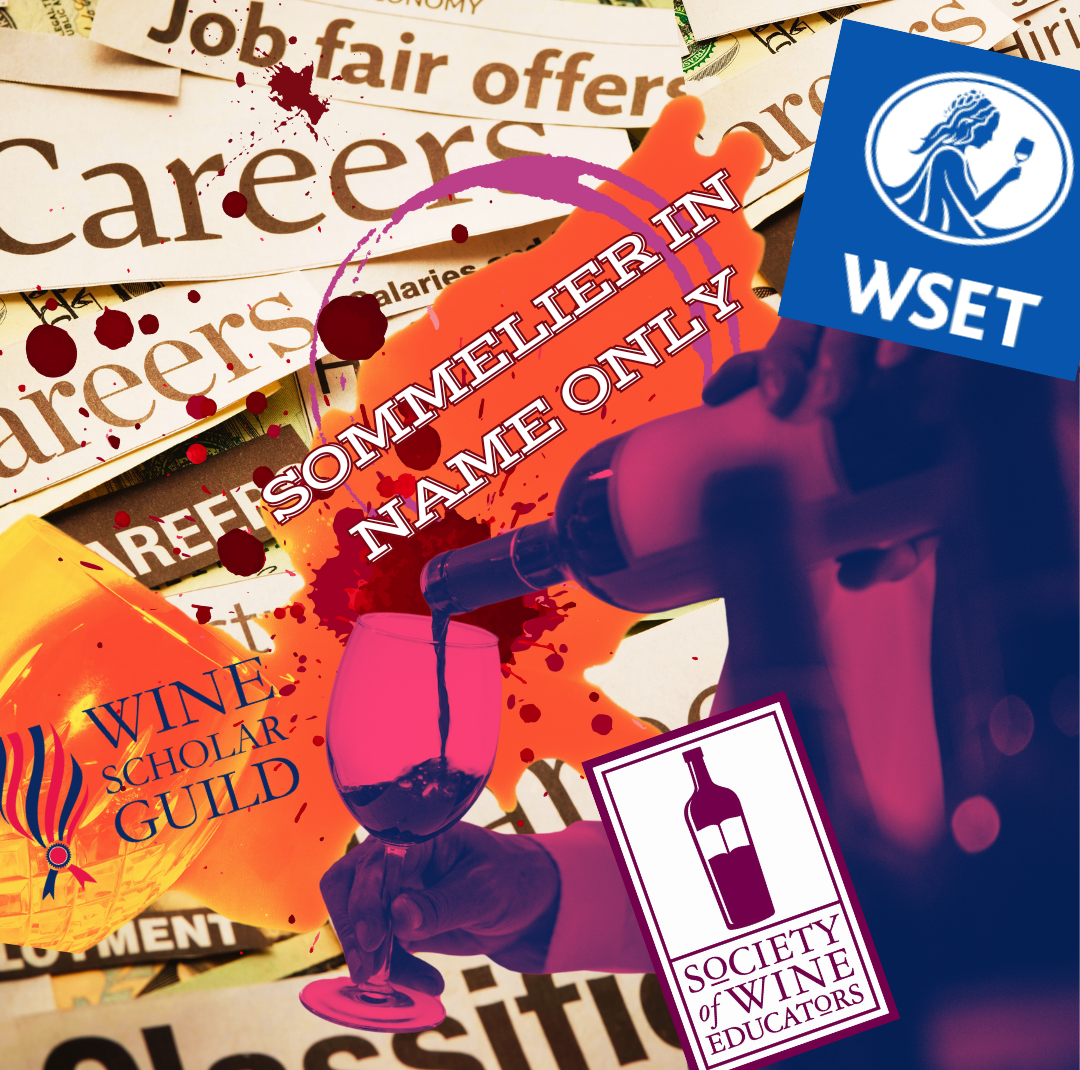SOMMELIER IN NAME ONLY
Once during a job interview someone stated how great it would be to have another sommelier on staff. Encouraging words but also slightly upsetting since no one who worked there was a Certified Sommelier. Did it actually matter though? The job was not even in fine dining, the usual sanctum of the profession. I thought back to the work, money, and time I had to spend to pass the examination from the Court of Master Sommeliers which grants the use of the Certified Sommelier title. Did that work give me the right to a little entitlement at best or self-righteousness at worst? The Court of Master Sommeliers may not own the warmth and generosity of the hospitality spirit, but they can test you for it and label you a sommelier. Would anything else be in name only?
The sommelier vocation has seen some changes over the years with many members forgoing the fine dining workplace rigidity typically associated with the profession. Many sommeliers now work in retail wine stores across the country or less formal smaller and creative wine lounges. One current definition of a sommelier is of an all-purpose wine steward, a catch all title regarding all things wine and bar. Many current job postings may be listed as seeking one but what is really needed is just another warm body able to open twenty-five bottles of Rombauer Chardonnay a shift. In the wine industry though the certification is still something to aspire to, a recognition of years of hard work previously, often the first major step toward a professional career.
Numerous wine education programs thrive alongside the CMS such as the Wine Scholar Guild, Society of Wine Educators, and the Wine Spirits and Education Trust. Each tries to impart and provide a distinct emphasis such as stress filled service examinations for the CMS and a scholarly academic focus for the WSET. It’s not unusual now for wine professionals to hold multiple credentials from these programs, combining their best features and strengths but further blurring the lines that separated them to employers and the wine public. Taking advantage of this surplus of wine awards are businesses in need of promoting tasting events, exaggerating the qualifications of students of wine in their staff, even so far as advertising an Introductory Sommelier as a Master Sommelier to fill seats. Outrage will be measured by your level of wine nerd though, with most people just wanting their glass filled with something bubbly without the lecture that it’s actually not Champagne.
Does having a qualification around the equivalent of the Certified Sommelier exam give someone leeway to be called one though? Not according to any of the major wine education programs. They communicate clearly the differences between them but still many in the wine industry through indifference or ignorance go out of their way to promote themselves as such. Maybe it’s the word itself that is just too tempting to use. Certified Sommelier is much more sexy sounding, earned or not, than a Level 3 award in wine or Certified Specialist of Wine used by the WSET and Society of Wine Educators.
There are many wine professionals that feel that a sommeliers only true workplace is a restaurant. At least with a Wine Spectator award of excellence and preferably with a five hundred bottle or more wine inventory. Upon passing the exam though The Court of Master Sommeliers doesn’t designate further who can or can’t use the certification, after all they’ll take your money no matter where you work. Of course, there are differences but the way I sold wine in a retail store was not much different from the way I sold it in a Forbes Five-Star fine dining restaurant. Talking to your guest and trying to understand the occasion, flavor profiles and food pairings they want to enjoy are smart decisions no matter what kind of wine setting you work.
Blind tasting is often viewed as the sommeliers star event as they frequently talk about wine characteristics from regions around the world as well as attend many industry tastings featuring some of the most sought-after wines. They aren’t the only ones doing this, however. Many wine buyers in large volume retail stores taste around six thousand wines or more annually, meet with winemakers to discuss wines frequently and attend the same tastings as sommeliers. Some of the best tasters I have had the pleasure to analyze wine with held no wine certifications at all and were not going out of their way to receive one anytime soon. If a Certified Sommelier represents a certain talent of tasting ability certainly these kinds of retail professionals are on the same level.
A Certified Sommelier is a well-earned designation, given by satisfying high demands while your nerves are near full panic and there is no other wine program other than the CMS that offers it. There will always be someone who wants the title without the effort as well as qualified people who could pass the exam but are more focused on their work. If by reading this far you had hoped to find some sort of definitive conclusion, you might want to stop now. For the people willing to equate all wine certifications I’ll pour a New Zealand Sauvignon Blanc when you ask for a Sancere, similar in some ways but never the same thing. When I receive great wine service there are a few things each time has in common. A great wine suggestion that paired beautifully with food and a sociable responsive service that enhanced a good time to a memorable event. I don’t know what certifications many of these talented wine professionals had when I enjoyed their service but if it didn’t matter then it certainly doesn’t matter now.






